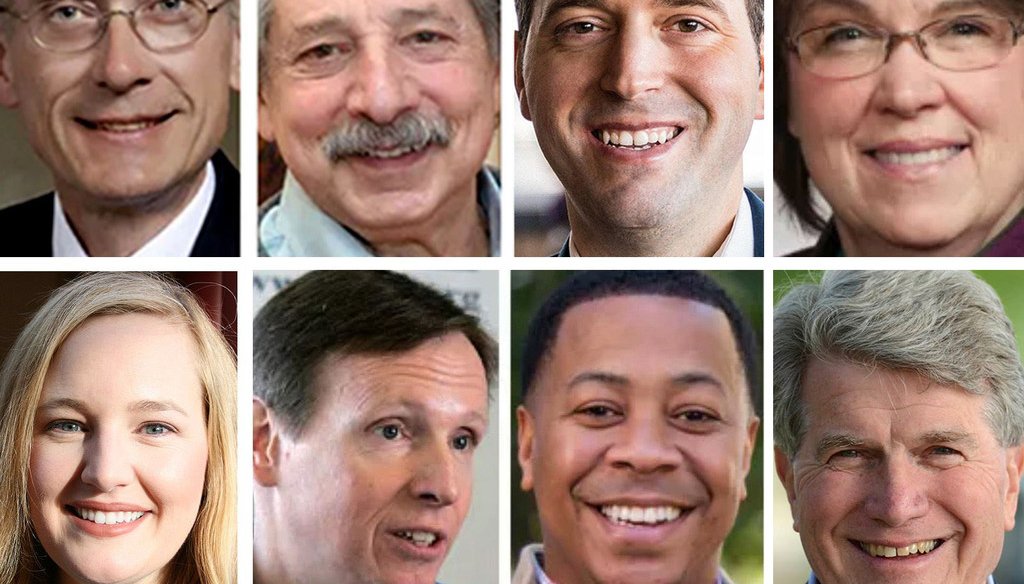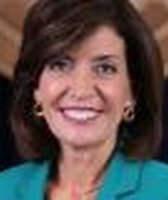Stand up for the facts!
Our only agenda is to publish the truth so you can be an informed participant in democracy.
We need your help.
I would like to contribute

It’s still early -- the next general election for governor in Wisconsin is still nearly a year away.
But a historic number of Democrats is lining up to vie for the chance to take on two-term Republican incumbent Scott Walker.
Here’s a quick look at the PolitiFact files for the most visible candidates. They have paid staff and organized campaigns.
The primary election is Aug. 14, 2018.
If you see something we should fact check on any of the gubernatorial candidates, let us know: [email protected].
Sign up for PolitiFact texts
The state schools superintendent and Madison resident is the lone statewide elected official to have launched a gubernatorial campaign.
"Job creation fell by 70 percent in Wisconsin in 2016" under Scott Walker.
Our rating: Mostly True.
Evers was essentially on target in that the one-year growth in private-sector jobs in 2016 was 66 percent lower than the growth in 2015 (13,000 jobs versus 38,000 jobs) -- though it’s important to note that private-sector jobs have increased each year during Walker’s tenure, but much more slowly in 2016. Where clarification was needed was that Walker’s performance is only one of many factors affecting job growth.
A study of where teachers apply to work found that "less than 5 percent wanted to work in rural Wisconsin."
Our rating: False.
The study found that schools in cities, suburbs or towns all draw more interest than rural districts, but Evers badly overstated the case. A total of 45 percent of teachers in the study showed interest in rural vacancies.
"Wisconsin’s graduation rates have grown to over 90 percent" since Evers became state school superintendent.
Our rating: Mostly False.
By the traditional measure -- graduation in four years -- Wisconsin’s rate is one of the best in America, but still below 90 percent using one approach. Using the other, it topped that mark -- but before Evers even took office. Meanwhile, the extended-year graduation rate (graduating in five or six years) provides an element of truth to the claim.
A private school tax break in the Wisconsin state budget is "the most generous in the nation."
Our rating: Half True.
Evers made this claim in 2013. At that time, the tax break was among the most generous -- for parents with multiple children attending a private high school, for example. But depending on various factors, it wasn’t necessarily more generous than other states.
MATT FLYNN
The lawyer and former state Democratic Party chief said that under Walker, "average wages, when adjusted for inflation, are lower today than they were under Jim Doyle," a Democrat who was Walker’s predecessor.
Our rating: Half True.
Adjusting for inflation, the average wage is higher under Walker than it was when Doyle left office in 2010. But sometimes people use the more common term average when they’re actually referring to the median -- which some economists say is a better measure for wages because an average can be distorted by people who earn very high wages. The median wage was higher when Doyle left office than it is under Walker.
The businessman who lives in the Milwaukee suburb of Fox Point and is a political newcomer.
"Black Americans still earn less than 73 percent of what white men make."
Our rating: Half True.
Gronik garbled the statistic in more than one way. But his central point — that there is an observable difference between what black workers and white workers make — is supported by the data.
Wisconsin is "guaranteeing Foxconn almost $3 billion, but Foxconn is not contractually guaranteeing how many full-time employees it will hire, for how long and at what pay."
Our rating: Half True.
Wisconsin is guaranteeing to pay Foxconn up to $2.85 billion -- but the full amount would be paid only if the company invests at least $9 billion in its plant and, in rough numbers, employs at least 13,000 people earning at least $30,000 per year.
Says Walker "has taken money away from internet expansion in our state."
Our rating: Mostly False.
In 2011, Walker’s first year in office, the state returned $23 million to the federal government -- though the decision is not as simple as Gronik portrays it. Since then, Walker’s office has increased funding for broadband development grants.
Price tags aside, the data available on rural coverage put the state’s reach on par with Minnesota -- which spent tens of millions more in the same time frame -- and in the middle of the pack of neighbors Illinois, Iowa and Michigan.
Wisconsin is "dead-last in creating new businesses" for "three years in a row."
Our rating: Half True.
Gronik was correct when citing the 2015, 2016 and 2017 rankings from the respected nonprofit Kauffman Index on Startup Activity. But that index, while it takes into account what portion of a state’s businesses were created in a given year, also considers two other variables. So, it supports Gronik’s statement only to a point.
Conversely, Wisconsin ranked between 29th and 34th for 2014 through 2016, according to the latest figures from the federal Bureau of Labor Statistics. Those rankings are based strictly on the percentage of a state’s business establishments that were created in each year.
MIKE MCCABE
McCabe is the former executive director of the Wisconsin Democracy Campaign, which tracks campaign financing.
"When you look at all the state and local taxes we pay in Wisconsin, the wealthiest 1 percent pay the lowest overall tax rate."
Our rating: Mostly True.
His claim was based on a 2015 report which found that the top 1 percent of earners pay 6.2 percent of their income in state and local taxes -- a lighter burden than six lower income groups. The report’s methodology had its critics, but it was the latest available study that attempts to assess state and local tax burdens.
Wisconsin's 2011-’13 state budget includes "a 15 percent increase for road construction and yet we’ve got local towns tearing up" paved roads and replacing them with gravel.
Our rating: False.
McCabe relied on a budget proposal document that didn’t spell out the full amounts spent on highways. And he relied on a statement by a towns association official who could cite only one example of a paved road being converted to gravel -- years before Walker was elected governor.
MAHLON MITCHELL
The state firefighters union president, who ran for lieutenant governor in the 2012 recall election, said Wisconsin has "the fastest-shrinking middle class in the country."
Our rating: Mostly False.
Mitchell pointed to a report by Pew Charitable Trusts, which compared the states going back to 2000. Using Pew’s formula and running the latest-available data, we found Wisconsin ranked first in the shrinkage of the size of its middle class when comparing 2000 to 2016. But Mitchell made his statement while criticizing Walker, and during Walker’s tenure, Wisconsin’s shrinkage ranked 14th when comparing 2010 to 2016.
On his previous checks, which date back to the failed 2012 recall against Walker, Mitchell received a True for a claim about 2012 GOP presidential nominee Mitt Romney and Romney's use of a veto as Massachusetts governor; a Mostly True for an attack on Walker over access to Planned Parenthood; and a True a claim about new Wisconsin businesses not having to pay taxes.
KELDA HELEN ROYS
Roys is a former state Assembly representative from Madison. She said in December 2017 that under President Donald Trump’s "new tax plan … 99.8% of Americans" get "not one nickel" in tax cuts. Our rating was Pants on Fire, given that tax cuts are widely proposed among various income groups.
Her two previous fact checks date back to 2012 and her unsuccessful run for the Democratic nomination for the congressional seat now held by Democrat Mark Pocan. Roys said she "stood up to" Walker on tax cuts "for wealthy corporations" while her congressional opponent voted with Walker, a claim that earned a Half True. And she received a False for saying an area near a proposed northern Wisconsin iron ore mine was "15 hours away" from where public hearing on mining was held.
2017: Under Walker, Wisconsin is "still 16,000 manufacturing jobs lower than we were during the recession." Mostly True. And: Says Walker is proposing to add 485 employees "in the category of supervisor and management" to his Department of Administration. Mostly True. And: Wisconsin children are crossing "condemned bridges in the middle of the winter to get to the school bus." Half True.
2014: "If you make the average amount of people in Wisconsin, $50,000, you got $1.60 less a week in taxes" under the state income-tax cut, but "it didn’t show up in your paycheck." Mostly True.
2013: Because of Walker’s budgeting, a greater percentage of general fund tax dollars is "going to pay off debt than ever before in our history." Half True. And: Walker bought "80 new, brand-new vehicles" for the state that "we probably don’t need." Mostly False.
2012: Says 21,000 Wisconsin residents got jobs in 2011, but "18,000 of them" were in other states. False.
DANA WACHS
Wachs is a lawyer and state representative from Eau Claire.
Says Walker's "listening sessions" are "invite-only and excluding the press."
Our rating: True.
We found that as Walker traveled Wisconsin to meet with residents, he asks various people, including Democratic lawmakers, for suggestions on who to invite to his listening sessions. But the sessions are not open to the public or to the press, only to people who are invited.
Note: This article has been updated -- most recently on Dec. 13, 2017, adding Roys -- as more Democratic candidates have entered the 2018 governor’s race.
Our Sources
PolitiFact Wisconsin items as noted


























